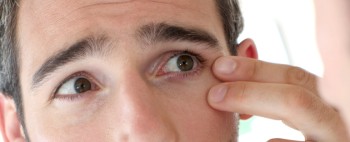(10) FAQs About Contact Lenses
Many people ask about contact lenses and how useful are they in treating refractive errors. In this article, we will answer the most common FAQs about contact lenses.
What are contact lenses?
Contact lenses are transparent plastic permeable flexible lenses that cover your cornea (the window of your eye). They are designed to correct your refractive error according to your visual acuity test. They are of different curvatures and power to correct errors like nearsightedness, farsightedness, and/or astigmatism.What are contact lenses made of?
- Rigid Gas-Permeable Lenses:
- Soft contact lenses:
How long can I wear contact lenses?
There are several longevity types of contact lenses:- Daily disposables: these are used for one day only then threw away.
- Biweekly and Monthly disposables: these are used for 15-30 days then replaced with new ones.
- Extended wear: this type of contact lenses you can sleep with them overnight, either daily or up to 30 days according to its instructions.
How are contact lenses different than eyeglasses?
Eyeglasses and contact lenses share the same treatment concept, using specific lenses, curvature, and power to correct your refractive error. Both modalities do not cure nearsightedness or farsightedness, but it helps overcome the problem of the refractive error blurred image.Should I go for contact lenses or eyeglasses?
Choosing between glasses and lenses to correct the refractive error, depends mainly on your daily routine, lifestyle, personal preference, your budget, your fashion sense, your activity level, and of course your budget. If you are an athlete, or a professional dancer or a swimmer then regardless of the budget, contact lenses are the best option as they allow you to practice daily without any discomfort. While if you are a teacher, a doctor or an architect then the eyeglasses will not stand in the way of your work, in fact, it can give you an extra stylish edge. But nowadays most people prefer contact lenses because it allows them to move along freely with your daily routine and activities. Contacts can also give you a more natural look as no one can know you are wearing one and they never get foggy or break and injure your face.Do contact lenses require extra care?
Although they are very easy to wear and get used to, contact lenses require meticulous care. Since they are stuck to your cornea and eye, it is more prone to contract infectious diseases and cause dry eyes. Contact lenses care tips:- Always wash your hand before touching your face and your contact lenses.
- Avoid soap when washing your hands especially moisturized ones.
- Dry your hand in lint-free towels.
- Keep the cleansing solution nearby, remove the lens carefully and rub it softly with a good amount of the lens solution in the palm of your hands. This ensures that the lens is cleansed off buildup, cosmetics, sand, debris and anything that may interfere with the lens functions and comfort.
- Rinse the lens, to remove these impurities and put it into the lens case that’s full with new lens solution (don’t add new solution over the old)
- Keeping it in its case overnight ensures disinfection.
- Repeat again for the other pair.
Extra tips:
- Put your lenses before putting your make-up and remove it before removing your make-up.
- Never use tap water to clean your lenses.
- Stay away from heat sources when you are wearing your lenses
- Always wear sunglasses or goggles if you are in a windy or sandy climate.
- Always keep your fingernails short and clean when handling the lenses.
- Never wear someone’s else contact lenses.
What are the disadvantages of contact lenses?
- Difficult to wear: not all people can wear contact lenses easily. It takes precision and courage to stick something on a daily basis into your eyes
- Hypoxia: This means reduced oxygenation of the cornea leading to dryness of the eye and maybe corneal damage.
- Computer vision syndrome: unlike eyeglasses, there are no photochromic or antireflective lenses to protect your eyes from harmful light.
- Extra care: as mentioned earlier, contacts require extra care and this may not be suitable for everyone with their hectic schedules.
- Eye infection: failing to take care of your lenses and eyes may lead to viral or bacterial infection of the eye. Aka pink eye.
- Expensive: whether you chose the disposable type or the extended wear, both may be over your budget and are must be replaced when expired.
Are contact lenses dangerous?
Absolutely not! Contact lenses are not dangerous at all, in fact, they are very safe and easy to use. But like anything else, if not taken care of properly it may cause some problems that will require you take them off immediately and seek medical help. These signs include:- Blurry vision
- Burning sensation of the eyes
- Discharge of the eye
- Gritty eyes
- Extra sensitivity to light
- Pink eye
- Teary eyes
- Corneal ulcer.











